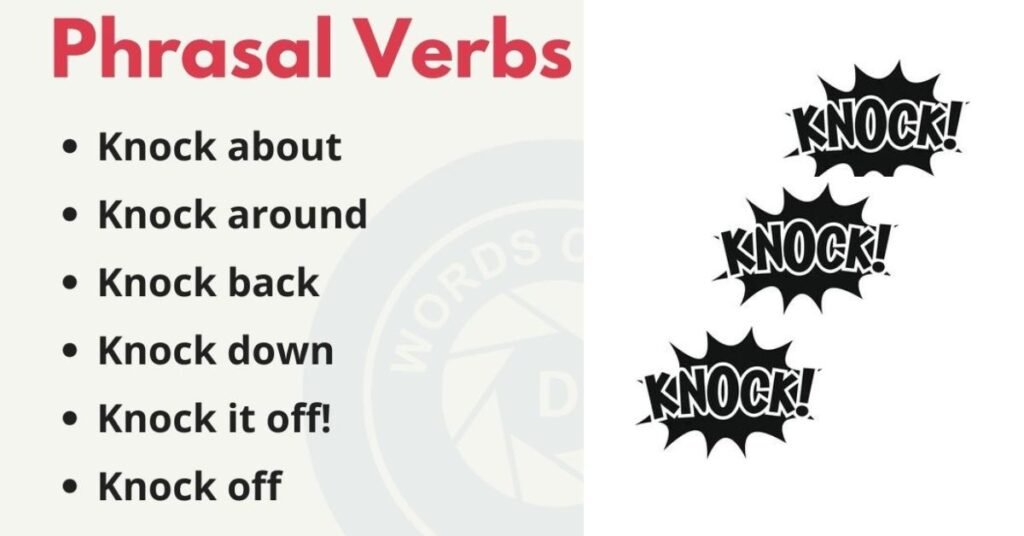Phrasal Verbs are verbs that make our articles posts or blogs worth reading. When you use Phrasal Verbs your English sounds like a natural. To cater to this, here are some most commonly used Phrasal Verbs. Read these mostly used Phrasal Verbs and use them in your daily life conversation. Let’s dive deep into Phrasal Verbs and bring attraction to our English speaking. Here we’ll learn phrasal verbs. let’s start.

Phrasal Verbs
- Look up (to search for information or advice):
She looked up the recipe online before attempting to bake the cake.
- Break down (to stop functioning or to fail suddenly):
Unfortunately, my car broke down on my way out of town.
- Get off (to leave or exit from a vehicle or transportation):
We say to get off if you leave walking and we say to get out if you have to climb out so you get off a bus a tram a train, you get out of a car or taxi.
- Shoot off (to move quickly or suddenly):
As soon as the bell rang the children shot off towards the playground.
- Calm down (to become less anxious or agitated):
I always try to take a deep breath to calm down before giving a presentation.

- Get on with something (to continue with a task or activity, especially after an interruption):
Right, that’s enough TV time to get on with your homework.
- Come across (to encounter or find a person or thing unexpectedly):
You won’t believe who I came across at the Bookshop today!
- Look after (to take care of or to provide assistance to someone):
Jane will look after the children while we’re at dinner.
- Knockover (to accidentally cause something to fall or tip over):
The strong wind knocked over many of the newly planted trees in the park.

- Turn on (to activate or start a device or Appliance):
Can you turn on the heater it’s freezing in here.
- Set up (to establish or create something like a business or organization):
Sarah decided to set up a charity to help underprivileged children in her community.
- Whip up (to quickly and skillfully prepare something usually food):
My mom used to whip up the most delicious pasta in just a few minutes.
- Turn down (to reject an offer request or opportunity):
Unfortunately, we’ve had to turn down several incredible job applicants due to budget constraints.
- Work out (to have a positive outcome):
I haven’t found a publisher for my book yet, but I’m sure it’ll work out.
- Give up (to quit or stop trying usually due to difficulties or challenges):
After hours of trying to solve the puzzle, she finally gave up.

- Take on (to accept responsibility or challenge):
Mark was eager to prove himself to the higher-ups and quickly agreed to take on the team leader role.
- Dust off (to revive or reuse something neglected or forgotten):
Ali decided it was time to dust off the guitar he bought as a teenager and learn to play once and for all.
- Figure out (to find a solution to a problem or discover a way to do something):
He read the instructions several times but still couldn’t figure out how to assemble the bookshelf.
- Catch up (to get up to date or reach the same level as others after missing):
After missing a few classes, Lisa needed to catch up on her coursework.
- Tell off (to scold or reprimand someone for their behavior or actions):
We sat in silence as Miss Langford told Rachel off for being 10 minutes late to class.
- Faf about (British informal) (to waste time or engage in unproductive activities):
Instead of studying for his exams, Tom would often faf about on social media.
- Bring up (to mention or introduce a topic or subject in conversation):
Sarah decided not to bring up the fact that she was moving out of the country during the family dinner.

- Rub off on (to have a positive influence on someone causing them to adopt certain qualities or habits):
Her enthusiasm for volunteering began to rub off on her friends, inspiring them to join too.
- Go by (to pass or elapse):
The years seemed to go by quickly as she watched her children grow up.
- Cut back on (to reduce something):
I need to cut back on the amount of money I spend on takeaways.
- Let down (to disappoint or fail to meet someone’s expectations):
Marian says she will be here tomorrow, she won’t let me down, will she?
- Call off (to cancel an arranged event or activity):
The picnic had to be called off due.
28. Sort out (to deal with a problem or situation and find a solution):
We need to sort out this mess in the living room before our guests arrive.
- Look forward to (to feel happy or excited about something that is going to happen in the future):
I’m looking forward to seeing my friends this weekend.
- Pay off (to be successful or beneficial in the long run):
Studying hard now will pay off when it comes to exam time.

- Turn out (to happen in a particular way):
The party turned out to be a lot of fun!
- Fall apart (to break down or collapse):
My old car is starting to fall apart.
- Makeup (to invent a story or excuse that is not true):
Don’t worry, I’ll make up an excuse for you being late.
- Come up with something (to think of an idea or solution):
The team is trying to come up with a new marketing campaign.
- Insist on (to demand or firmly request something):
My grandma insisted on paying for the whole meal.
- Take back (to retract a statement or offer):
I can’t take back what I already said, but I apologize if I offended you.
- Turn into (to change into something different):
This caterpillar will eventually turn into a butterfly.
- Brush off (to ignore someone dismissively):
He just brushed off my questions and walked away.
- Cheer up (to make someone feel happier):
A funny movie is a great way to cheer you up.
- Grow on (to gradually become liked or appreciated):
At first, I didn’t like the new song, but it kind of grew on me.

- Move on (to stop thinking about something and start thinking about something else):
- It’s time to move on from that past relationship.
- Set out (to begin a journey or activity):
- We set out on our camping trip early in the morning.
- Find out (to learn or discover something):
- I’m trying to find out more about the new job opportunity.
- Run into (to meet someone unexpectedly):
- I ran into an old friend at the grocery store yesterday.
- Get up to (to be doing something, especially something secret or wrong):
- What are the kids getting up to these days?
- Warm to (to gradually begin to like someone or something):
- At first, he was shy, but I slowly warmed to him.

- Cut off (to end a conversation or supply of something abruptly):
- She cut me off before I could finish my sentence.
- Tag along (to join someone on a trip or activity, even though you weren’t originally invited):
- Can I tag along with you to the movies?
- Turn up (to arrive at a place):
The guests are starting to turn up for the party.
- Fill somebody in (to give someone all the necessary information):
Fill me in on what I missed at the meeting.

I hope you’ll like this post about Phrasal Verbs. Give your feedback about this journey of learning Phrasal Verbs. I have also written post on phonics, why to learn grammar, and how to increase vocabulary. Now You can say I got a hang of Phrasal Verbs. Remember to use these Phrasal Verbs in your daily life speaking because only reading is not enough. Must make sentences using these Phrasal Verbs. Must share this Phrasal Verbs post with your friends, family, and colleagues who want to learn English phrasal Verbs.
Happy learning!










Keep functioning ,remarkable job!